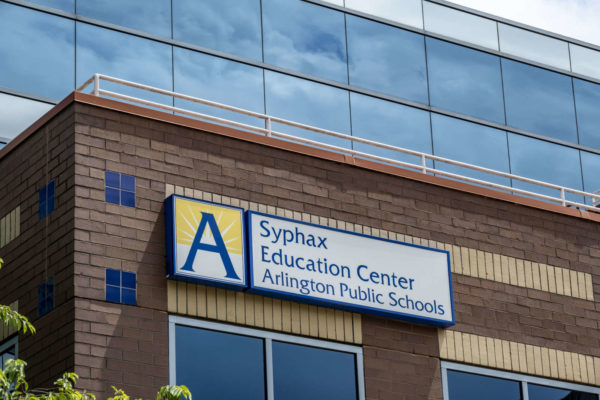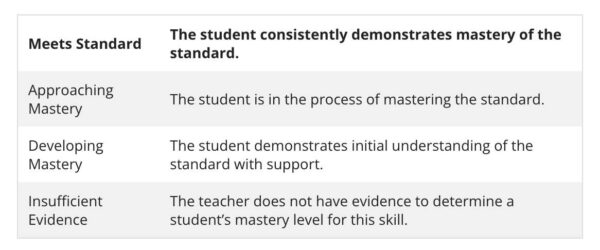
Over the last seven years, Arlington Public Schools has transitioned more than a dozen elementary schools to a different style of grading, with more on the way next year.
The schools system says the goal is to get away from simplistic letter grades and to better describe student progress toward mastering standards — without encouraging unhealthy levels of competition among students.
During the transition to the new system, APS has held meetings to bring parents up to speed. But ARLnow has heard from many parents who say that despite the laudable goals, the new notation system confuses them and make it harder to know if their child needs academic support outside of school.
There may be something lost in translation, too, as parents with limited English proficiency rely on school-based bilingual specialists or Google Translate for interpretation. Some parents say they’ve given up looking at the report card and would like to return to letter grading.
“Why did this change?” said Celia Jimenez, through a Spanish interpreter. “We had a system that worked and it was easy to tell how the child was doing in school because you looked at the report card. A, good. B, good. C not doing so well, let me find out what’s going on.”
She says she has stopped looking at the report cards for her fifth-grader it’s “useless and she doesn’t understand any of it.”
For community advocate Saul Reyes, this is an equity issue impacting people who don’t have the resources to understand the report card, independently measure how their child is progressing and provide academic support outside the class.
“Arlington talks about equity. Equity is about equal outcomes for everyone,” he said. “How is this equitable?”
Before the switch, students in grades 3-5 received traditional letter grades — A,B,C, D, and E — while students in first and second grade received either a “P” for “making expected progress” or an “N” for “not making expected progress.”
“‘ABCDE’ grading drives students toward ‘A,’ and leaves no room to differentiate exceptional skill levels, and can inadvertently create conditions of comparison and judgment that are counterproductive to learning,” APS says in a website unpacking standards-based grading.
The new system, used in 17 elementary schools as of this year, is as follows:

“It’s pretty hard to understand. That is Chinese for me,” said Abel Flores, using the Spanish-language equivalent of the idiom “It’s all Greek to me.” (Flores talked to ARLnow in English but his first language is Spanish.)
APS spokesman Frank Bellavia says bilingual family specialists “have been very helpful in aiding parents in understating the progress reports” while schools hold meetings early in the school year to explain this system of grading and families can reach out to their child’s teacher or school counselor for more information.
Both Jimenez and Flores said APS can’t rely on specialists because translating report cards is outside of their wheelhouse and there are too many parents needing help. Reyes says he has spoken to bilingual specialists who say they’re overwhelmed by translation requests.
“There is terminology that’s difficult to understand and difficult to interpret,” he said.
One middle school parent, who requested anonymity because she worked for APS, remembers translating report cards “all the time” as a bilingual specialist.
“Sometimes I didn’t know what to say to a parent,” she said. “‘I guess your son is doing good’ — that was the only thing there was to say… It was really sad, especially for parents who didn’t know English. This made them far away from the school system.”
Jimenez and Flores instead rely on parent-teacher conferences and create their own homework. Jimenez has her eldest, a 10th grader at Thomas Jefferson High School for Science and Technology in Fairfax County, make up assignments for her youngest using materials kept over the years. Flores comes up with math problems and has his kids read out loud in English.
“We just need to trust the teacher,” Flores said. “If your teacher says ‘your kids are doing good,’ you say thank you and you trust them. It’s very frustrating.”
But some teachers say they struggle with how to grade kids under the new system, too.
One first-grade teacher told June Prakash, the president of the Arlington Education Association — the union representing Arlington teachers — that the method doesn’t work well for science and social studies. The teacher said there isn’t enough time to teach those skills to a level of mastery, so educators tend to mark all students as “meets standards.”
“I don’t think parents understand it,” the teacher said. “I think they read the comments and that is all. It has been explained numerous times but only the parents in-the-know know it. No one ever calls me to ask questions about the report card. I don’t even know if they read it.”
A former APS first-grade teacher told Prakash the new system for that grade level is better than the most recent system before it, which was “M” for “meeting,” “P” for “progressing” and “D” for “developing.”
“As a parent myself, I liked the transition to this when my son was in elementary school,” Prakash said. “To be fair, I understood the rationale behind this type of grading system, but I liked how you could see the strengths and weaknesses (if existent) across the standard. It was far more informative than saying ‘your child is progressing with math.'”
In a letter last month, the Arlington County Council of PTAs highlighted issues for parents with limited English proficiency, which also include navigating the online parent portal to access the report card. The countywide PTA president, Claire Noakes, had suggestions for making the jargon easier to understand.
“For example, the term ‘Meets Standard’ really means ‘Demonstrates Mastery,’ which would make more sense as the term at the top of the list, above ‘Approaching Mastery,'” she said. “If you do not want to modify the jargon, at the very least, there could be more accompanying information for each category to help better explain the different terms.”
School Board watchdog group Arlington Parents for Education had other suggested solutions.
“We encourage APS to clarify the levels and reinstate the previously-used ‘Exceeds Expectations’ category, which most other approaches to Standard-Based Assessments include,” it said in a statement to ARLnow. “Parents shouldn’t have to struggle to gauge their child’s performance in school because the terminology is confusing and students deserve to have a clear understanding of where they stand to have goals to work towards.”
So will it stick?
Gunston Middle School uses a hybrid of letter grades and standards-based grading practices, but likely will pursue “an alternate form of reporting to parents beginning in the 2023-24 school year,” Bellavia says.
Meanwhile, at least four additional schools — it has not yet been revealed which — will shift to the standards-based grading style next school year.
“It looks like the schools made up their minds that this is a system they want to keep,” Reyes said.

